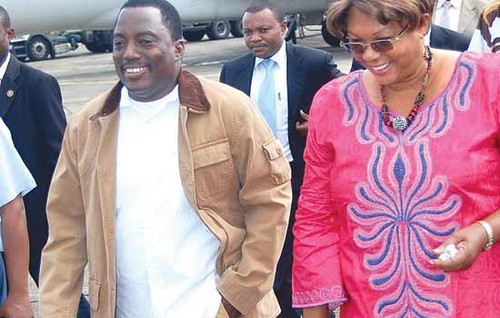
Democratic Republic of Congo President Joseph Kabila during a visit to the Federal Republic of Nigeria on September 28, 2010. The two countries are population and mineral resource giants on the African continent., a photo by Pan-African News Wire File Photos on Flickr.
The elections in Congo
Wednesday, 14 December 2011
Nigerian Guardian
Editor
PREDICTABLY, the declaration of Joseph Kabila as winner of the general elections in the Democratic Republic of Congo (DRC) has raised the spectre of much-feared political instability in the country. For sure, the elections were afflicted with a fair share of irregularities and outright malpractices. However, this realistically should not be seen as far-fetched, considering its closeness to a five-year civil war that almost destroyed the country. It is imperative after all said and done, to eschew violence and allow the full play out of the election processes.
For Africa, it is a season of election. Recently Liberia held its general elections, closely followed by that of Congo DRC on November 28, 2011. The elections were seen as important for the peoples of Congo DRC for a number of reasons. One, they were the second to be held since the end of its last war 1998-2003 and first to be organized by the government instead of the international community which supervised the 2006 elections. Two, they were wide-ranging and all-inclusive in the country ravaged by several decades of conflict. Three, they were seen as very important for the peace and stability of the country. In the elections, 18,500 candidates contested for the 500 seat-parliament while 11 candidates vied for the presidency including the incumbent Joseph Kabila and the veteran politician, Etienne Tshisekedi. The elections true to prediction were marred by a great deal of irregularities. Logistics problems were observed in the run up to the election, a reality which had made the international community to advise a postponement in order to tie the loose ends in the process.
However, elections held in the 60,000 polling stations in the Africa’s third largest nation with the anticipated logistics problem and electoral violence. Materials had to be conveyed to the largely inaccessible vast expanse of land with helicopters. There were shortages of ballot papers as well as late arrival of voting materials in some polling stations. Observers reported ballot stuffing in the Easter city of Goma. Violence also reared its ugly head during the elections. For example, vehicles conveying election materials were attacked in Lubumbashi in south of the country while three polling stations were burnt and a female electoral observer was badly injured in West Kasai. These, combined with the pre-election atmosphere in which security forces and candidates in the election fomented violence, cast a gloom over the electoral exercise.
Contrary to pre-elections optimism, the omen from the Congo is not positive. Provisional count of votes put incumbent President Joseph Kabila who polled 49 per cent ahead of opposition leader Tshisekedi with a share of 34 per cent. Last Friday, overcoming obvious logistic problems, which had heightened tension, full results for the presidential election were tallied and Joseph Kabila was declared winner with the same 49 per cent and his main opponent, Tshisekedi polled 32 per cent. With the results, the much feared renewed circle of violence seems in the offing unless steps are urgently taken to calm frayed nerves. Monsieur Tshisekedi, in ways reminiscent of Allasane Ouattara of Cote d’Ivoire, has declared himself president-elect of Congo DRC.
While people must be allowed to express themselves and their votes must count, the candidates who have taken part in the elections must put their country’s interest above personal ambition. They must save their country from war and conflicts, which had led to the death of 4. 5 million people in the one and half decades, largely as result of impoverishment. Besides, judicial review process must be preferred and explored, rather than a resort to outright violence.
Congo DRC matters to the continent and perhaps, to the world. This country was at the heart of Belgium’s colonial expansion in Africa – the so-called Congo Free State of King Leopold II in the late 19th and early 20th centuries. Congo is rich in natural minerals. A free Congo has the potential of leading the African liberation and this was viewed as counterproductive to the forces of colonialism in central and southern Africa. The logic was to keep this country balkanised in ways that would aggrandise Western interest. Hence the support to the secessionist bids in Katanga and South Kasai by the West, 1960-1965. The dynamics has not changed and the continuing strategic importance of Congo lies in its abundant rare metals. This is seen as the continuing challenge of the Congo. Even African countries have become part of the scramble for the resources of this country. This explains the Great Lakes crisis since 1996 that has seen Angola, Namibia, Rwanda, Uganda, Zimbabwe and other African countries becoming key players in the country.
Therefore, a stable Congo is important for the continent’s rebirth, and all well-meaning Congolese and Africans alike must ensure that this happen. This much has been acknowledged by the incumbent President Kabila who noted that Congo had come a long way “from war and conflict of every type. We must take care not to go back to that.” Today the United Nations has its largest peace-keeping mission in Congo DRC. It would be recalled that the enduring Congo crisis cost the life of the then UN Secretary-General, Dag Hammarskjold, who was himself complicit in the first post-independent Congolese crisis that led to the death of Patrice Lumumba. A stable Congo would naturally relieve the august body of its burden and divert its scarce resources to other troubled spots in the world.
No comments:
Post a Comment